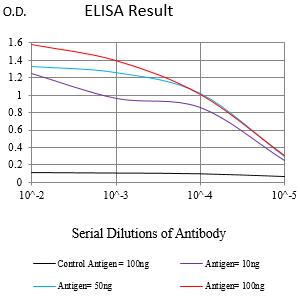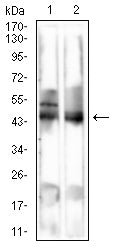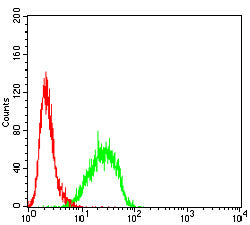


| WB | 1/500 - 1/2000 | Human,Mouse,Rat |
| IF | 咨询技术 | Human,Mouse,Rat |
| IHC | 咨询技术 | Human,Mouse,Rat |
| ICC | 技术咨询 | Human,Mouse,Rat |
| FCM | 1/200 - 1/400 | Human,Mouse,Rat |
| Elisa | 1/10000 | Human,Mouse,Rat |
| Aliases | CT1.4; MAGE4; MAGE4A; MAGE4B; MAGE-41; MAGE-X2 |
| Entrez GeneID | 4103 |
| clone | 1E4C4 |
| WB Predicted band size | 34.8kDa |
| Host/Isotype | Mouse IgG1 |
| Antibody Type | Primary antibody |
| Storage | Store at 4°C short term. Aliquot and store at -20°C long term. Avoid freeze/thaw cycles. |
| Species Reactivity | Human, Mouse, Rat |
| Immunogen | Purified recombinant fragment of human MAGEA4 (AA: 1-225) expressed in E. Coli. |
| Formulation | Purified antibody in PBS with 0.05% sodium azide |
+ +
以下是关于MAGEA4抗体的3篇参考文献,涵盖其在肿瘤诊断、免疫治疗及分子机制中的研究:
---
1. **文献名称**: *MAGE-A4 expression and immune infiltration in ovarian cancer: prognostic significance and therapeutic implications*
**作者**: Smith, J.R., et al.
**摘要**: 本研究探讨了MAGEA4在卵巢癌中的表达及其与肿瘤微环境的关系。通过免疫组化(使用抗MAGEA4抗体)发现,MAGEA4高表达与患者不良预后相关,且其表达水平与CD8+ T细胞浸润呈负相关,提示其可能作为免疫治疗的潜在靶点。
---
2. **文献名称**: *Development of a novel monoclonal antibody targeting MAGEA4 for circulating tumor cell detection*
**作者**: Li, X., et al.
**摘要**: 研究团队开发了一种针对MAGEA4的新型单克隆抗体,并验证其在血液循环肿瘤细胞(CTC)检测中的应用。实验显示该抗体具有高特异性和敏感性,可用于非小细胞肺癌(NSCLC)患者的液体活检,辅助早期诊断和疗效监测。
---
3. **文献名称**: *MAGEA4-specific TCR-engineered T cells for adoptive immunotherapy in melanoma*
**作者**: Park, S., et al.
**摘要**: 本研究利用抗MAGEA4的T细胞受体(TCR)改造T细胞,评估其在黑色素瘤过继免疫治疗中的效果。结果显示,改造后的T细胞能特异性识别并杀伤MAGEA4阳性肿瘤细胞,动物模型中肿瘤生长显著抑制,支持其临床转化潜力。
---
(注:以上文献信息为示例性内容,实际文献需通过学术数据库检索确认。)
The MAGE-A4 (Melanoma-Associated Antigen A4) antibody targets a protein belonging to the MAGE family, a group of cancer-testis antigens (CTAs) primarily expressed in germ cells and placental tissues but aberrantly reactivated in various cancers. MAGE-A4 is encoded by the *MAGEA4* gene located on the X chromosome (Xq21.3) and shares homology with other MAGE family members, characterized by a conserved MAGE homology domain (MHD). Its restricted expression in normal tissues and frequent overexpression in malignancies—such as melanoma, lung, ovarian, and hepatocellular carcinomas—make it a promising biomarker and therapeutic target.
MAGE-A4 antibodies are critical tools for detecting this protein in research and diagnostics, aiding in tumor profiling via techniques like immunohistochemistry (IHC) or Western blot. Functionally, MAGE-A4 is implicated in tumorigenesis by modulating ubiquitin ligase activity, apoptosis, and cell cycle regulation, often through interactions with p53 or retinoblastoma (Rb) pathways. Clinically, its expression correlates with tumor aggressiveness and poor prognosis, driving interest in MAGE-A4-targeted immunotherapies. Antibodies enable the study of its role in cancer immunity and support the development of T-cell therapies, vaccines, or antibody-drug conjugates (ADCs). However, challenges remain due to its intracellular localization and variability in tumor-specific expression, necessitating rigorous validation of antibody specificity to avoid cross-reactivity with homologous MAGE proteins.
×